- Home
- T. S. Eliot
The Complete Poems and Plays, 1909-1950 Page 8
The Complete Poems and Plays, 1909-1950 Read online
Page 8
In the lost lilac and the lost sea voices
And the weak spirit quickens to rebel
For the bent golden-rod and the lost sea smell
Quickens to recover
The cry of quail and the whirling plover
And the blind eye creates
The empty forms between the ivory gates
And smell renews the salt savour of the sandy earth
This is the time of tension between dying and birth
The place of solitude where three dreams cross
Between blue rocks
But when the voices shaken from the yew-tree drift away
Let the other yew be shaken and reply.
Blessèd sister, holy mother, spirit of the fountain, spirit of the garden,
Suffer us not to mock ourselves with falsehood
Teach us to care and not to care
Teach us to sit still
Even among these rocks,
Our peace in His will
And even among these rocks
Sister, mother
And spirit of the river, spirit of the sea,
Suffer me not to be separated
And let my cry come unto Thee.
ARIEL POEMS
Journey of the Magi
‘A cold coming we had of it,
Just the worst time of the year
For a journey, and such a long journey:
The ways deep and the weather sharp,
The very dead of winter.’
And the camels galled, sore-footed, refractory,
Lying down in the melting snow.
There were times we regretted
The summer palaces on slopes, the terraces,
And the silken girls bringing sherbet.
Then the camel men cursing and grumbling
And running away, and wanting their liquor and women,
And the night-fires going out, and the lack of shelters,
And the cities hostile and the towns unfriendly
And the villages dirty and charging high prices:
A hard time we had of it.
At the end we preferred to travel all night,
Sleeping in snatches,
With the voices singing in our ears, saying
That this was all folly.
Then at dawn we came down to a temperate valley,
Wet, below the snow line, smelling of vegetation,
With a running stream and a water-mill beating the darkness,
And three trees on the low sky.
And an old white horse galloped away in the meadow.
Then we came to a tavern with vine-leaves over the lintel,
Six hands at an open door dicing for pieces of silver,
And feet kicking the empty wine-skins.
But there was no information, so we continued
And arrived at evening, not a moment too soon
Finding the place; it was (you may say) satisfactory.
All this was a long time ago, I remember,
And I would do it again, but set down
This set down
This: were we led all that way for
Birth or Death? There was a Birth, certainly,
We had evidence and no doubt. I had seen birth and death,
But had thought they were different; this Birth was
Hard and bitter agony for us, like Death, our death.
We returned to our places, these Kingdoms,
But no longer at ease here, in the old dispensation,
With an alien people clutching their gods.
I should be glad of another death.
A Song for Simeon
Lord, the Roman hyacinths are blooming in bowls and
The winter sun creeps by the snow hills;
The stubborn season has made stand.
My life is light, waiting for the death wind,
Like a feather on the back of my hand.
Dust in sunlight and memory in corners
Wait for the wind that chills towards the dead land.
Grant us thy peace.
I have walked many years in this city,
Kept faith and fast, provided for the poor,
Have given and taken honour and ease.
There went never any rejected from my door.
Who shall remember my house, where shall live my children’s children
When the time of sorrow is come?
They will take to the goat’s path, and the fox’s home,
Fleeing from the foreign faces and the foreign swords.
Before the time of cords and scourges and lamentation
Grant us thy peace.
Before the stations of the mountain of desolation,
Before the certain hour of maternal sorrow,
Now at this birth season of decease,
Let the Infant, the still unspeaking and unspoken Word,
Grant Israel’s consolation
To one who has eighty years and no to-morrow.
According to thy word.
They shall praise Thee and suffer in every generation
With glory and derision,
Light upon light, mounting the saints’ stair.
Not for me the martyrdom, the ecstasy of thought and prayer,
Not for me the ultimate vision.
Grant me thy peace.
(And a sword shall pierce thy heart. Thine also).
I am tired with my own life and the lives of those after me,
I am dying in my own death and the deaths of those after me.
Let thy servant depart,
Having seen thy salvation.
Animula
‘Issues from the hand of God, the simple soul’
To a flat world of changing lights and noise,
To light, dark, dry or damp, chilly or warm;
Moving between the legs of tables and of chairs,
Rising or falling, grasping at kisses and toys,
Advancing boldly, sudden to take alarm,
Retreating to the corner of arm and knee,
Eager to be reassured, taking pleasure
In the fragrant brilliance of the Christmas tree,
Pleasure in the wind, the sunlight and the sea;
Studies the sunlit pattern on the floor
And running stags around a silver tray;
Confounds the actual and the fanciful,
Content with playing-cards and kings and queens,
What the fairies do and what the servants say.
The heavy burden of the growing soul
Perplexes and offends more, day by day;
Week by week, offends and perplexes more
With the imperatives of ‘is and seems’
And may and may not, desire and control.
The pain of living and the drug of dreams
Curl up the small soul in the window seat
Behind the Encyclopaedia Britannica.
Issues from the hand of time the simple soul
Irresolute and selfish, misshapen, lame,
Unable to fare forward or retreat,
Fearing the warm reality, the offered good,
Denying the importunity of the blood,
Shadow of its own shadows, spectre in its own gloom,
Leaving disordered papers in a dusty room;
Living first in the silence after the viaticum.
Pray for Guiterriez, avid of speed and power,
For Boudin, blown to pieces,
For this one who made a great fortune,
And that one who went his own way.
Pray for Floret, by the boarhound slain between the yew trees,
Pray for us now and at the hour of our birth.
Marina
Quis hic locus, quae
regio, quae mundi plaga?
What seas what shores what grey rocks and what islands
What water lapping the bow
And scent of pine and the woodthrush singing through the fog
What images return
Those who sharpen the tooth of the dog, meaning
Death
Those who glitter with the glory of the hummingbird, meaning
Death
Those who sit in the sty of contentment, meaning
Death
Those who suffer the ecstasy of the animals, meaning
Death
Are become unsubstantial, reduced by a wind,
A breath of pine, and the woodsong fog
By this grace dissolved in place
What is this face, less clear and clearer
The pulse in the arm, less strong and stronger —
Given or lent? more distant than stars and nearer than the eye
Whispers and small laughter between leaves and hurrying feet
Under sleep, where all the waters meet.
Bowsprit cracked with ice and paint cracked with heat.
I made this, I have forgotten
And remember.
The rigging weak and the canvas rotten
Between one June and another September.
Made this unknowing, half conscious, unknown, my own.
The garboard strake leaks, the seams need caulking.
This form, this face, this life
Living to live in a world of time beyond me; let me
Resign my life for this life, my speech for that unspoken,
The awakened, lips parted, the hope, the new ships.
What seas what shores what granite islands towards my timbers
And woodthrush calling through the fog
My daughter.
The Cultivation of Christmas Trees
There are several attitudes towards Christmas,
Some of which we may disregard:
The social, the torpid, the patently commercial,
The rowdy (the pubs being open till midnight),
And the childish — which is not that of the child
For whom the candle is a star, and the gilded angel
Spreading its wings at the summit of the tree
Is not only a decoration, but an angel.
The child wonders at the Christmas Tree:
Let him continue in the spirit of wonder
At the Feast as an event not accepted as a pretext;
So that the glittering rapture, the amazement
Of the first-remembered Christmas Tree,
So that the surprises, delight in new possessions
(Each one with its peculiar and exciting smell),
The expectation of the goose or turkey
And the expected awe on its appearance,
So that the reverence and the gaiety
May not be forgotten in later experience,
In the bored habituation, the fatigue, the tedium,
The awareness of death, the consciousness of failure,
Or in the piety of the convert
Which may be tainted with a self-conceit
Displeasing to God and disrespectful to the children
(And here I remember also with gratitude
St. Lucy, her carol, and her crown of fire):
So that before the end, the eightieth Christmas
(By ‘eightieth’ meaning whichever is the last)
The accumulated memories of annual emotion
May be concentrated into a great joy
Which shall be also a great fear, as on the occasion
When fear came upon every soul:
Because the beginning shall remind us of the end
And the first coming of the second coming.
UNFINISHED POEMS
Sweeney Agonistes
Fragments of an Aristophanic Melodrama
Orestes: You don’t see them, you don’t — but I see them: they are hunting me down, I must move on.
Choephoroi.
Hence the soul cannot be possessed of the divine union, until it has divested itself of the love of created beings.
St. John of the Cross.
* * *
Fragment of a Prologue
DUSTY. DORIS.
DUSTY: How about Pereira?
DORIS: What about Pereira?
I don’t care.
DUSTY: You don’t care!
Who pays the rent?
DORIS: Yes he pays the rent
DUSTY: Well some men don’t and some men do
Some men don’t and you know who
DORIS:You can have Pereira
DUSTY: What about Pereira?
DORIS: He’s no gentleman, Pereira:
You can’t trust him!
DUSTY: Well that’s true.
He’s no gentleman if you can’t trust him
And if you can’t trust him —
Then you never know what he’s going to do.
DORIS: No it wouldn’t do to be too nice to Pereira.
DUSTY: Now Sam’s a gentleman through and through.
DORIS: I like Sam
DUSTY: I like Sam
Yes and Sam’s a nice boy too.
He’s a funny fellow
DORIS: He is a funny fellow
He’s like a fellow once I knew.
He could make you laugh.
DUSTY: Sam can make you laugh:
Sam’s all right
DORIS: But Pereira won’t do.
We can’t have Pereira
DUSTY: Well what you going to do?
TELEPHONE: Ting a ling ling
Ting a ling ling
DUSTY: That’s Pereira
DORIS: Yes that’s Pereira
DUSTY: Well what you going to do?
TELEPHONE: Ting a ling ling
Ting a ling ling
DUSTY: That’s Pereira
DORIS: Well can’t you stop that horrible noise?
Pick up the receiver
DUSTY: What’ll I say?
DORIS: Say what you like: say I’m ill,
Say I broke my leg on the stairs
Say we’ve had a fire
DUSTY: Hello Hello are you there?
Yes this is Miss Dorrance’s flat —
Oh Mr. Pereira is that you? how do you do!
Oh I’m so sorry. I am so sorry
But Doris came home with a terrible chill
No, just a chill
Oh I think it’s only a chill
Yes indeed I hope so too —
Well I hope we shan’t have to call a doctor
Doris just hates having a doctor
She says will you ring up on Monday
She hopes to be all right on Monday
I say do you mind if I ring off now
She’s got her feet in mustard and water
I said I’m giving her mustard and water
All right, Monday you’ll phone through.
Yes I’ll tell her. Good bye. Goooood bye.
I’m sure, that’s very kind of you.
Ah-h-h
DORIS: Now I’m going to cut the cards for to-night.
Oh guess what the first is
DUSTY: First is. What is?
DORIS: The King of Clubs
DUSTY: That’s Pereira
DORIS: It might be Sweeney
DUSTY: It’s Pereira

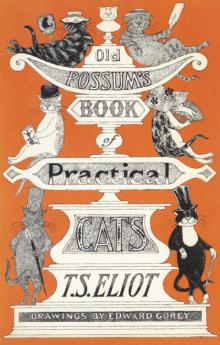 Old Possum's Book of Practical Cats
Old Possum's Book of Practical Cats The Family Reunion
The Family Reunion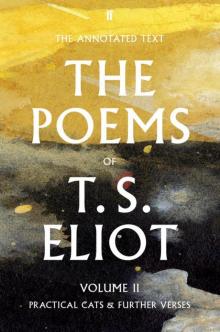 T. S. Eliot the Poems, Volume 2
T. S. Eliot the Poems, Volume 2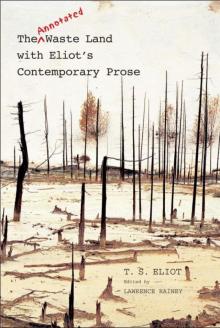 The Waste Land
The Waste Land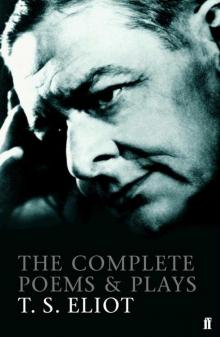 The Complete Poems and Plays, 1909-1950
The Complete Poems and Plays, 1909-1950 Letters of T.S. Eliot: 1898-1922
Letters of T.S. Eliot: 1898-1922 The Letters of T. S. Eliot, Volume 1: 1898-1922
The Letters of T. S. Eliot, Volume 1: 1898-1922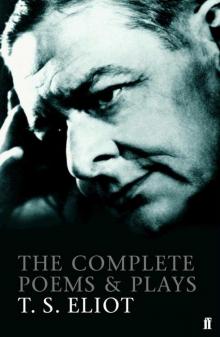 Complete Poems and Plays
Complete Poems and Plays